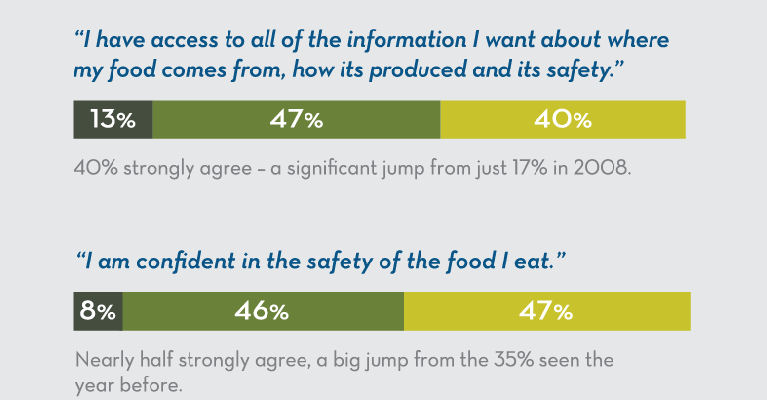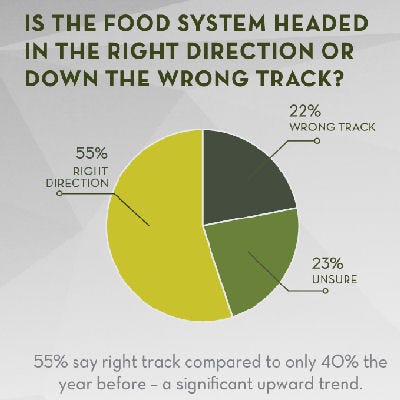5 signs consumers just might be falling for the food industry
Center for Food Integrity shows positive trends that point to improving relationship between consumers and U.S. food industry.
February 14, 2017

February has long been celebrated as a month of romance, but the relationship between consumers and the U.S. food industry isn’t always smooth sailing. A growing curiosity and skepticism about how food is produced and who’s producing it leaves some consumers with cold feet, wondering if they can trust that the people producing their food are doing what’s in their best interest.
The latest consumer trust research from The Center for Food Integrity (CFI), “Inside the Minds of Influencers: The Truth About Trust,” shows five positive trends that point to a blossoming relationship:
1. "Is the food system headed in the right direction or down the wrong track?" Fifty-five percent of CFI survey respondents said the "right track." That’s up 15% from the previous year – a significant upward trend. Just 34% felt that way in 2013.
“While we didn’t ask why they believe it’s headed in the right direction, we assume that today’s consumer is pleased with the food industry and its willingness to provide the foods they’re looking for – from high-protein and gluten-free products to organic foods and 'clean' ingredients,” JJ Jones, director of development for CFI, said.
Each year, CFI surveys consumers on more than 30 trends within food and agriculture and asks them to rate statements on a scale of one to 10, where one through three is low agreement, four through seven is moderate agreement and eight through 10 is strong agreement.

2. “I have access to all of the information I want about where my food comes from, how it’s produced and its safety.” Forty percent strongly agree with that statement — a significant jump from just 17% when the survey began in 2008. It shows that the food industry has stepped up to engage and provide consumers with access to the information that’s feeding their curiosity.
3. “I am confident in the safety of the food I eat.” Nearly half strongly agree, a big jump from the 35% seen the year before.
4. “I trust food produced in the U.S. more than I trust food produced outside the U.S.” A significant majority — 59% — strongly agree with this statement. That’s up from 51% in the previous survey.
5. "U.S food is among the most affordable in the world today.” Forty-four percent strongly agree, representing the strongest level of agreement with this statement since it was first posed in 2007. Strong agreement rose 14% from the previous survey.
The numbers are promising, but it’s certainly not a green light for the food industry to take its relationship with consumers for granted. There’s always room for improvement.
CFI research shows that consumers expect and deserve transparency, and they want the good, the bad and the ugly.
“They also want the ability to engage, to be heard and acknowledged and to get straight answers to their questions,” Jones said, adding that "consumers want to know they can trust the food industry, and earning trust starts with consumers knowing that you share their values when it comes to important issues like food safety, health, animal well-being and the environment.”
The CFI trust model demonstrates that communicating with shared values is three to five times more important to building trust than simply sharing facts and science.
Earning trust is a long-term commitment but well worth the effort, Jones said; “you simply can’t have a meaningful relationship without it.”
You May Also Like



